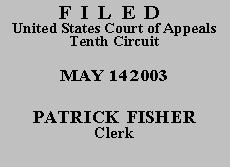

| BRENDA WEST-ANDERSON,
Plaintiff-Appellant, v. CHOICEPOINT SERVICES, INC., Defendant-Appellee. |
|
Plaintiff-appellant Brenda West-Anderson, appearing pro se, appeals from the district court's order granting summary judgment in favor of Defendant-appellee Choicepoint Services, Inc. (Choicepoint) on her racial discrimination claim under Title VII of the Civil Rights Act of 1964, 42 U.S.C. §§ 2000e to 2000e-17. Our jurisdiction arises under 28 U.S.C. § 1291. We affirm.
"We review a grant of summary judgment de novo, applying the same standard as the district court." Ferroni v. Teamsters, Chauffeurs & Warehousemen Local No. 222, 297 F.3d 1146, 1149 (10th Cir. 2002). "Summary judgment is appropriate if, viewing the evidence in the light most favorable to the nonmoving party, there is no genuine issue of material fact and the moving party is entitled to judgment as a matter of law." Id. "While [Plaintiff's] pro se pleadings are to be construed liberally and held to a less stringent standard than formal pleadings drafted by lawyers, [she] must nonetheless set forth sufficient facts to support [her] claims." Diaz v. Paul J. Kennedy Law Firm, 289 F.3d 671, 674 (10th Cir. 2002). Summary judgment is appropriate when a jury trial would serve no purpose. In this case the district court ruled that there was no need for a trial because any reasonable jury, if properly instructed by the judge on what the law is, would decide that Plaintiff was not an employee of Choicepoint. We agree.
Under Title VII, it is "an unlawful employment practice for an employer . . . to discriminate against any individual with respect to his compensation, terms, conditions, or privileges of employment, because of such individual's race . . . ." 42 U.S.C. § 2000e-2(a)(1). An employer is defined as "a person engaged in an industry affecting commerce who has fifteen or more employees . . . ." Id. § 2000e(b). An employee, in turn, is defined as "an individual employed by an employer . . . ." Id. § 2000e(f).
Given this statutory framework, "[i]n order to establish a prima facie case under Title VII, [Plaintiff] was required to prove, among other things, that [Choicepoint] was her employer." Lockard v. Pizza Hut, Inc., 162 F.3d 1062, 1069 (10th Cir. 1998). As the district court concluded, to determine whether Plaintiff made a prima facie showing that Choicepoint was her employer, the evidence in the record must be examined under the "hybrid" common-law economic-realities test. See R., Vol. II, Doc. 89 at 7 (citing Lambertsen v. Utah Dep't of Corr., 79 F.3d 1024, 1028 (10th Cir. 1996)). Moreover, because the purpose of the hybrid test is to distinguish an employee from an independent contractor, see Bristol v. Bd. of County Comm'rs of County of Clear Creek, 312 F.3d 1213, 1217 (10th Cir. 2002) (en banc), the main focus of the inquiry is "'the employer's right to control the means and manner of the worker's performance.'" R., Vol. II, Doc. 89 at 7 (quoting Oestman v. Nat'l Farmers Union Ins. Co., 958 F.2d 303, 305 (10th Cir. 1992) (further quotation omitted)); accord Lambertsen, 79 F.3d at 1028.
The relevant facts pertaining to the working relationship between Plaintiff and Choicepoint are set forth in the memorandum and order entered by the district court on July 23, 2002. See R., Vol. II, Doc. 89 at 2-4. The district court concluded that the uncontroverted facts in the record established, as a matter of law, that Plaintiff was an independent contractor of Choicepoint, and not an employee. Id. at 8-11. As a result, the district court determined that Plaintiff was not entitled to the protections of Title VII. Id. at 6.
We agree with the district court's analysis. We further note that the arguments asserted by Plaintiff on appeal are without merit. First, although Plaintiff admits that she was initially an independent contractor, she claims that Choicepoint "unilaterally converted" her status to that of an employee by subsequently directing her to perform work that was different, both in terms of scope and compensation, from the work contemplated by the parties' June 12, 1997, written contract. Specifically, Plaintiff alleges that (1) Choicepoint directed her to perform projects in geographical areas different from the areas agreed to in the parties' contract; and (2) she was paid a higher hourly rate than the rate agreed to in the parties' contract. See Aplt. Br. at 5-7. We fail to see why those changes would mean that she became an employee. As the district court concluded, even if we accept her allegations as true, this evidence had no bearing "on [Choicepoint's] right to control the manner and means of [P]laintiff's work performance, nor does it bear on any of the other factors relevant to the application of the hybrid test." R., Vol. II, Doc. 89 at 11.
Second, in her reply brief, Plaintiff makes a number of arguments based on information and documents she obtained, either from Choicepoint in discovery or through her own research, pertaining to the corporate relationship between Choicepoint's parent company and its predecessor. "This court does not ordinarily review issues raised for the first time in a reply brief," Stump v. Gates, 211 F.3d 527, 533 (10th Cir. 2000), and Plaintiff has failed to provide us with a sufficient reason for departing from this rule here. In any event, none of her arguments is relevant to the issue of whether she was an employee rather than an independent contractor.
For substantially the same reasons stated in the district court's memorandum and order, we AFFIRM.
Entered for the Court
Circuit Judge